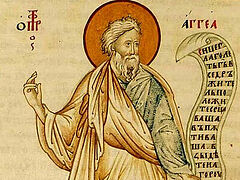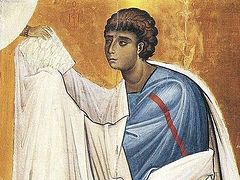 Photo: wikipedia.org In the name of the Father, and of the Son, and of the Holy Spirit.
Photo: wikipedia.org In the name of the Father, and of the Son, and of the Holy Spirit.
Dear brothers and sisters! Today, the Orthodox Church prayerfully honors a renowned Old Testament saint—the prophet Nahum. For us, as faithful Christians, the Book of Nahum holds great significance, as it reveals God’s abundant mercy toward humanity. God is long-suffering toward us, yet His wrath is great against those who persistently resist His will and violate His commandments. The Lord is jealous, and the Lord revengeth; the Lord revengeth and is furious; the Lord will take vengeance on His adversaries, and He reserveth wrath for His enemies. The Lord is slow to anger, and great in power, and will not at all acquit the wicked (Nahum 1:2–3).
The Holy Prophet Nahum, one of the twelve so-called Minor Prophets, was from Galilee, from the village of Elkosh. According to the testimony of Blessed Jerome, Elkosh was a small village in Galilee, whose ruins he personally examined. It is likely that after the Assyrian invasion, the Prophet Nahum relocated to Judah and prophesied there in the 700s B.C. He was a contemporary of the Prophet Isaiah.
The Prophet Nahum, not sparing his own life, preached, prophesied, and served the Lord God with a pure heart. The primary message of the Book of Nahum is his prophecy of the fall and destruction of Nineveh, the capital of the Assyrian Empire, which posed a threat to the entire East. It foretells the calamities that the righteous Lord would bring upon this city and vividly describes the ultimate devastation of this great and heavily fortified metropolis. The Holy Prophet Nahum speaks with divine inspiration of God’s omnipotence, which encompasses the entire universe:
He rebuketh the sea, and maketh it dry, and drieth up all the rivers: Bashan languisheth, and Carmel, and the flower of Lebanon languisheth. The mountains quake at Him, and the hills melt, and the earth is burned at His presence, yea, the world, and all that dwell therein. Who can stand before His indignation? And who can abide in the fierceness of His anger? His fury is poured out like fire, and the rocks are thrown down by Him (Nahum 1:4–6).
The Prophet Nahum prophesied various historical events that later came to pass. According to tradition, he died at the age of forty-five and was buried in his homeland. His book reveals the character of its author, his moral strength, and the voice he was to his contemporaries and remains for us today.
What Can the Life of the Holy Prophet Nahum Teach Us Today?
Above all, the prophet exemplifies profound devotion to God and an unwavering determination to fulfill His commands. The Book of Nahum contains solemn prophecies about the imminent downfall of the Assyrian Empire’s chief city, Nineveh.
Why did God’s wrath fall upon Nineveh? From the Old Testament, we know that the people of Nineveh had already been warned of God’s judgment by the Prophet Jonah, who called them to repentance and to abandon their sinful ways. The Ninevites repented temporarily after Jonah's preaching, but seeing that the prophesied calamity did not befall them, they returned to their evil deeds, thereby again provoking God’s wrath and testing His long-suffering.
This vivid example highlights the need for continual repentance before God for our sins. While it is true that no one can live without sinning—each person being subject to passion—this does not absolve us of the duty to strive through repentance for a meeting with God and for unity with Him. The life and words of the Prophet Nahum call us to this sacred path of repentance and reconciliation with our Creator.
 The Fall of Nineveh by John Martin. Photo: wikipedia.org
The Fall of Nineveh by John Martin. Photo: wikipedia.org
Nineveh earned its fate through its idolatry, particularly its depravity and witchcraft, by which it enslaved nations. These grievous iniquities were followed by severe judgment—Nineveh and its inhabitants were destroyed by their enemies.
The bitter example of Nineveh’s fate should serve as a warning to us of the consequences that await us for a sinful and unrepentant life, which provokes our Creator to wrath. Yet, at the same time, the Prophet Nahum, through his words of encouragement to the faithful Jews of his time, speaks across the centuries to strengthen the faithful followers of Christ. He reminds us of true worship of God, the necessity of zeal for God, and the assurance that all schemes devised against God, His people, and His Church will be overthrown. For the Church is indeed the people of God.
Dear brothers and sisters, let us turn our prayerful gaze toward the Prophet Nahum. Let us remember the dire events that followed the apostasy of the people of Nineveh. The only path available to a Christian is the path that follows Christ. This path is challenging, but it is attainable for those who hate their sins and offer repentance. Let us pray to the Prophet Nahum to grant us the same zeal for God and defense of the truth. Amen.



